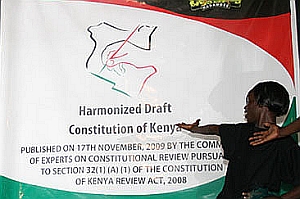Harmonized Constitution must Focus on Productivity

 |
| Harmonised Draft Constitution launch |
The Harmonized Draft Constitution of Kenya is stuck with the old mentality of fighting for and sharing the carcass. At independence, African elites gulped the carcass left behind by mzungu hunters in what we refer to as government. The debates on the new draft subliminally indicate individuals sharpening their knives to cut even bigger pieces for themselves.
The draft does not recognize that Kenya is in urgent need of productive citizens. The country must urgently wean itself off aid instead of simply appeasing those who want to "share" the little that is available. Kenya has an estimated GDP Per Capita of $1,600; big rich-poor gap; a Human Poverty Index of 29.5 % and relies heavily on donor funding, among other measurements that indicate low productivity among its citizens. A new constitution ought to capture the spirit and zeal to drive citizens towards increased productivity.
To draw an enforceable and respected constitution in Kenya and by extension Africa, we must recognize the existence of parallel systems in operation; the indigenous and the imposed. The imposed system (carcass left by mzungu) has never succeeded in "overthrowing" African traditions that guide people's sense of interpreting productivity. This partly explains why grandiose development projects yield minimal results or at best resistance. It will be therefore a disaster for Kenyans to simply copy-paste Western value systems into the constitution and ignore the underground system which from the country's history has the power to put machetes into people's hands.
Take Chapter Two in the draft constitution as an example; the declaration of Kenya as a Republic hides in ambiguous words such as "good governance and multi party democracy." Fourty-six years after independence, we ought to have known that creating structures that make politicians to effectively manage donor funds is not synonymous to good governance. Similarly, engaging in an electoral process that helps pick those who will manage and "share" such funds is not synonymous to "multiparty democracy." Such an approach breeds an elite class that would rather serve foreign interests rather than their country’s interest. The resultant effect is disillusioned masses who feel completely disconnected from government.
The declaration of the Republic of Kenya should explicitly capture the desire to have Kenyans create a new nation. The 2007/08 post election violence revealed that Kenya as a nation does not exist. The Republic of Kenya should be founded on the principle of individual ethnic communities and individual citizens agreeing to pay for the upkeep of their government.
Chapter Three on National Values, Principles and Goals is very disappointing. Unless Kenyans have values and goals that can lead to the baking of a bigger "National Cake" for everyone, values such as national unity, patriotism, human rights, social justice, recognition of civil society and eradicating corruption among others read more like an attempt to transform the country into a huge NGO. To have a knowledge driven economy, and citizens who transform Kenya's natural resources into wealth ought to be part of Kenya's core values.
If the Harmonized Constitution focused on making Kenyans productive; provided an avenue where citizens can exercise their power by paying for the upkeep of the government through taxes and other levies with a clause that they can starve such a government by withholding funds from it, there will be no need of debating on powers of Presidency and Prime Minister. It is therefore crucial that a new constitution for Kenya include a Productivity Chapter.
Kenya's Productivity Chapter ought to focus on creating structures through which Kenyans with new ideas and solutions to challenges that face the country get constitutional protection. A productivity council constituted under this chapter can work closely with both local and international patent offices to ensure that such innovations are protected by law. The duties of such a committee with offices throughout devolved centers of government will be to help identify, grow and market talent to investors. Such a council will also competitively offer incentives to innovators to provide solutions to the country's challenges on sector basis.
We ought to transform the colonial legacy that hunted down ethnic communities and grouped them into one country into a positive resource to create a new Kenya. A new constitution for the country must realize that the elite and donors serve as modern day Kings and Queens; appeasing them is to perpetuate old system that turns citizens into strangers in their own country.
Kenyans must participate in governance not only through the ballot but also through their wallets. Focus on productive citizens' is the key to reinforcing the covenant between citizens and the government.
Above all, please take time to read the Harmonized Draft Constitution of Kenya and mail your view to the Committee of Experts.
James Shikwati [email protected] is Director of Inter Region Economic Network .
